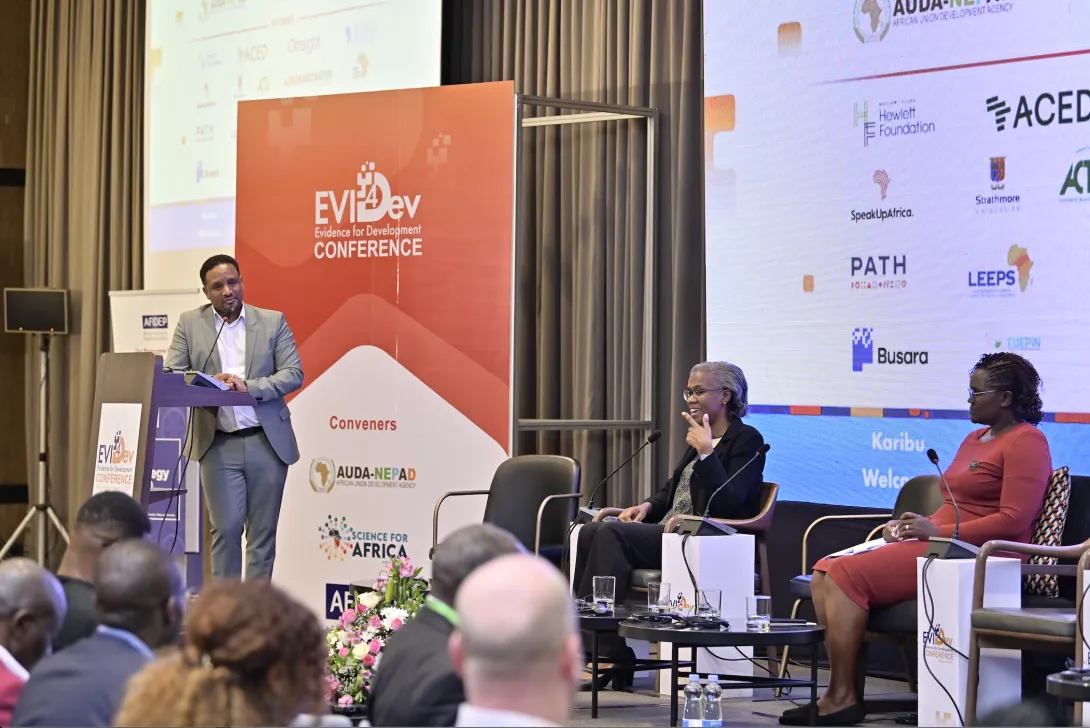
By Derick Ngaira
The closing day of the Evi4Dev Conference focused on the theme, “Science, Technology and Innovation (STI) Governance – Domestication of the STI Strategy for Africa (STISA) 2034.” The day featured dynamic voices from across the continent to discuss the practical steps needed to strengthen Africa’s research and development (R&D) landscape, scale up vaccine-preventable disease programmes, sustain genomic surveillance, and rethink financing for STI.
Session 35: Empowering African R&D – Practical pathways to resilience and impact
This session delved into how Africa can build resilient R&D systems that translate innovation into real-world impact. A key issue raised was the need for stronger infrastructure to train and retain scientists. Despite progress in genetic-based drug development and personalised medicine, local research environments still lag behind those in the Global North, particularly in resources and institutional support.
It was noted that the COVID-19 pandemic revealed that Africa indeed possesses a functional R&D ecosystem, but challenges remain in scaling it. There was emphasis on creating robust structures to better harness human capital and existing collaborations.
Data management was also highlighted. Experts mentioned the importance of digitalising health and clinical data, standardising datasets to fit local contexts, and prioritising quality storage and repurposing of patient data for research. Strategic investments in data systems and platforms were deemed essential to make informed, context-sensitive health decisions.
The conversation also called for breaking down intra-continental trade barriers, strengthening both national and regional institutions, and aligning R&D efforts with continental strategies like STISA 2034. Translating research into market-ready products, improving public-private sector collaboration, and incentivising innovation through tax policies were presented as key pathways to resilience.
The session was moderated by Kedest Tesfagiorgis from the Gates Foundation and featured a panel comprising leaders in African science and innovation, including Prof. Collen Masimirembwa, President and CEO of the African Institute of Biomedical Science and Technology; Prof. Isabella Oyier, Head of the Biosciences Department at the KEMRI-Wellcome Trust Research Program; Prof. Nicki Tiffin, Deputy Director of the South African National Bioinformatics Institute at the University of the Western Cape; and Dr Yaw Bediako, Co-founder and CEO of Yemaachi Biotech.
Session 46: Vaccine Preventable Diseases Programme – WHO Africa
This guest lecture by Prof Charles Wisyonge, Head of Vaccine Preventable Diseases Programme–WHO Africa, offered a sweeping view of the transformational impact of vaccines over the last century. From historic outbreaks of polio and yellow fever to the modern-day eradication of wild poliovirus in most parts of the world, the session celebrated immunisation as a life-saving intervention.
In Africa alone, more than 53 million lives have been saved through immunisation efforts over the last 50 years. The introduction of the Immunisation Agenda 2030 aims to further strengthen these gains by targeting 90% vaccine coverage in all member states, maintaining polio-free status, and integrating lessons from COVID-19 vaccine rollouts.
The need to scale up regional vaccine manufacturing in Africa was emphasised. Participants also called for more systems-driven immunisation decision-making that relies on local evidence and community engagement.
Session 47: Beyond COVID-19 – Sustaining Africa’s genomic surveillance gains
This session explored how Africa can maintain the momentum built during COVID-19 to ensure sustainable genomic surveillance. One of the most urgent needs identified was funding, particularly domestic funding, to reduce overreliance on donors.
Building institutional capacity to retain skilled personnel, developing long-term career paths, and creating partnerships between research institutes and universities were seen as vital for sustainability. The potential of artificial intelligence (AI) in supporting bioinformatics and accelerating genomic research was also highlighted.
There was a call for more government awareness and understanding of the practical benefits of genomics, as seen in malaria surveillance efforts. Investing in innovation incubators at universities and developing a cadre of trainers would help nurture local talent in genomics and related fields.
The session, moderated by Sofonias Tessema, Implementation Science Expert at Africa CDC, featured presentations from Dr Samuel Oyola, Senior Scientist: Molecular Biologist and Head of Genomics at the International Livestock Research Institute and Prof. Isabella Oyier.
Session 48: Reframing Africa’s STI financing amid global geopolitical shifts
The final session focused on how Africa can reimagine financing models for STI. Panellists emphasised the importance of investing in people, building strong institutional partnerships, and supporting locally led initiatives. The session critiqued current funding models that do not favour African priorities and called for African-led solutions and innovation ecosystems.
There was strong advocacy for reducing dependence on external donors by creating sustainable domestic funding channels. This includes increasing parliamentary allocations to research and communicating the value of R&D to the public. The session closed with a rallying call for collaboration, strategic planning, and the political will to fund research beyond the often quoted 2% of GDP threshold.
The session was moderated by Ms Lilian Mutengu, Program Manager at Science for Africa Foundation and Dr Engelbert Luchuo, Head of International Programs at African Population and Health Research Center (APHRC). Speakers included Dr Sultani Matendechero, Senior Deputy Director at Ministry of Health, Kenya; Dr Jordan Kyongo, Head of the East Africa Research & Innovation Hub, FCDO; and Dr Anthony Mveyange, Director of Programs – Synergy, APHRC.
Conclusion
The final day of the conference showcased the depth of ideas, as well as the urgency of action needed to elevate Africa’s research and innovation agenda. From strengthening institutions and digital systems to reshaping financing models and sustaining vaccine and genomic gains, the sessions painted a vivid roadmap for African R&D leadership in the years to come.
Watch the highlights here: https://www.youtube.com/watch?v=LMHow0nmq2I

